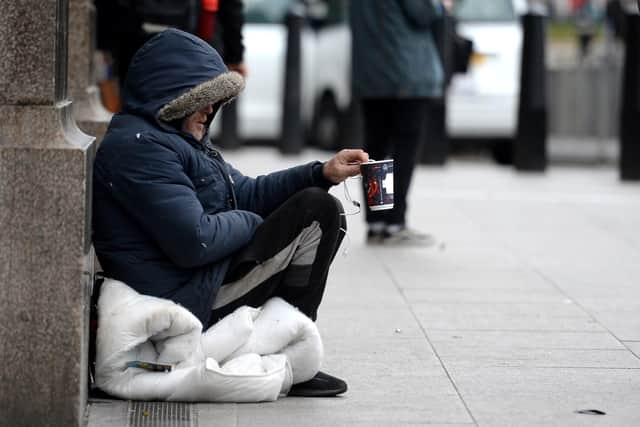Wigan Council spends millions on B&Bs and hostels for homeless
and live on Freeview channel 276
Housing and homelessness charity Shelter said families are being pushed into homelessness and living in "awful" temporary accommodation – something hotly disputed by Wigan town hall - due to unaffordable rent and lack of social homes.
Department for Levelling Up, Housing and Communities figures shows Wigan council spent a total of £2.4m on temporary homeless housing in the year to March, up significantly from £1.5m the year before.
Advertisement
Hide AdAdvertisement
Hide AdBed and breakfasts accounted for a significant amount of spending with £1.7m paid – 72 per cent of the total expenditure for temporary accommodation last year.


And about £282,000 (12 per cent) went towards hostels which includes refuges and emergency accommodation.
Last year's spending is also higher than the amount spent five years ago when £437,000 was put towards temporary homeless accommodation – a real-terms increase of 378 per cent.
Wigan Council says it does what it can to help people stay in their own homes but admits there have been increasing numbers coming to them in recent years, saying they are homeless as mortgages, rents and other bills rise and there remains a national shortage of social housing.


Advertisement
Hide AdAdvertisement
Hide AdAcross England, an estimated £1.6bn was used by local authorities towards short-term accommodation for people facing homelessness in 2021-22 – up five per cent from the previous year and a 62 per cent real-terms increase from five years ago.
Of last years total expenditure, £407m went towards bed and breakfasts and hostels. Spending on bed and breakfasts alone has increased seven per cent in real terms since 2016-17.
Polly Neate, chief executive of Shelter, said: “Homelessness is bad for the economy and it’s even worse for the people whose lives it destroys.
“It defies all logic to shell out over £1.6bn on grim B&Bs and grotty flats, instead of helping people to keep hold of their home in the first place."


Advertisement
Hide AdAdvertisement
Hide AdMs Neate added housing benefit – which assists people who are unemployed, low-income, or on other benefits to pay rent – has been frozen since 2020 "despite private rents rocketing".
She added: "This gaping hole in our country’s safety net is throwing families needlessly into homelessness and trapping them in awful temporary accommodation because they can’t afford private rentals and there are barely any social homes.
"Allowing homelessness to rise unchecked during the cost-of-living crisis, will only cost more in the long run.”
Jo Willmott, Director of Homes and Communities at Wigan Council said: “Sadly, in recent years we have seen increasing numbers of people coming to the council because they have been made homeless. This is due to things such as rising mortgage rates, no fault evictions, rapidly increasing rents in the private rented sector and lack of national investment in social housing. This means there is an unprecedented high level of demand for housing in Wigan borough and in other local authorities up and down the country.
Advertisement
Hide AdAdvertisement
Hide Ad“We do what we can to help people stay in their own homes, as part of our homeless prevention work, which can involve a range of measures such as liaison with landlords and mediation with family members.
“Where this isn’t possible, we work closely with a range of local partners including local housing providers, ethical private landlords, commissioned services as well as hotels/B&Bs to provide immediate accommodation of a decent standard, with connected support if required.
“Demand is rapidly increasing due to the cost-of-living crisis so spend on providing immediate accommodation has inevitably increased to ensure that people in urgent need are given somewhere decent to live while a more permanent solution is found.
“We are continuing to develop new options as part of our approach to achieve sustainable accommodation options for our residents.”
Advertisement
Hide AdAdvertisement
Hide AdA council spokesperson added: “We would strongly dispute any suggestion that we house people in subpar accommodation; Wigan Council actively works to ensure that any temporary accommodation we use is of a decent standard.”
Ms Neate said housing benefit must be unfrozen so people can better pay rent and added the Government must build "truly affordable" social homes to end homelessness.
A Department for Levelling Up, Housing and Communities spokesperson said it is providing councils with £316m this year to prevent homelessness.
They added: “Temporary accommodation is a last resort, but a vital lifeline for those at risk of sleeping rough.
Advertisement
Hide AdAdvertisement
Hide Ad“We know people are concerned about rising costs, which is why have announced the Energy Price Guarantee, to support household with their energy bills over the winter, and a further £37bn of support for those struggling with the cost of living.”
Earlier this month it was revealed that more than 100 households in Wigan were threatened with homelessness by landlords using "no-fault" eviction powers over three months this year.
Housing charity Shelter has urged the Government to bring forward its long-promised Renters' Reform Bill and ban section 21 notices – also known as no-fault evictions – after it was revealed they increased by more than three-quarters in a year across England.
In Wigan, 117 households were at risk of homelessness after they were served with a section 21 notice between April and June, the latest figures from the Department for Levelling Up, Housing and Communities show.
Advertisement
Hide AdAdvertisement
Hide AdThis was a slight increase from 79 between January and March, and 22 recorded over the same period last year.
The figures refer to households assessed as needing council support to prevent them from becoming homeless. After being hit with a section 21 notice, renters could be left with as little as two months to find somewhere new to live, despite the landlord not needing a reason to evict them.
